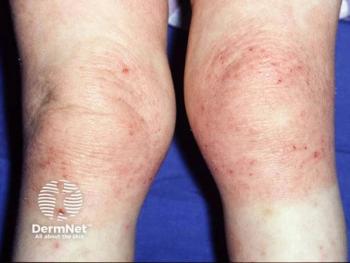
AD patients reflect high satisfaction, safety with dupilumab
A vast majority of patients with atopic dermatitis (AD) are satisfied with dupilumab (Dupixent, Sanofi and Regeneron) treatment, according to research presented at the European Academy of Dermatology and Venereology (EADV) Virtual Congress.
The vast majority of patients with atopic dermatitis are satisfied with dupilumab (Dupixent, Sanofi and Regeneron) treatment, according to a
“Treatment satisfaction is an important domain for patients,” says Jonathan Silverberg, MD, PhD, MPH, who was not involved with the studies. He is associate professor, director of clinical research and director of patch testing at George Washington University School of Medicine and Health Sciences.
Ultimately, says Dr. Silverberg, treatment satisfaction reflects patients’ overall experience with a drug and integrates elements of efficacy on signs and symptoms, as well as safety and tolerability. “If any of these are inadequate, patients are more likely to report poor treatment satisfaction. Moreover, patients with high treatment satisfaction are more likely to continue taking a medication.”
In an open-label extension of the phase 3 LIBERTY AD OLE trial, investigators analyzed efficacy, safety and satisfaction among 2677 adult patients who had been treated with dupilumab 300 mg weekly for up to 148 weeks. Investigators chose a dose higher than the approved 300 mg twice-monthly dose partly to increase the chances of observing rare side effects.
When the trial commenced, Dr. Silverberg says, data suggested that the 300 mg weekly dose would be more effective than 300 mg twice-monthly dosing. “From the phase 3 data, this turned out not to be the case. Nevertheless, there are occasional patients who require more frequent dosing, and these data provide reassurance about the safety-efficacy balance of the more frequent dose.”
At week 12, 87.4% of patients rated their treatment as good (22.8%), very good (37.4%) or excellent (27.2%), using the five-point Patient Assessment of Global Treatment Efficacy (PGATE) tool.1 The corresponding figure at week 124 was 90.6%.
“These findings show that patient satisfaction is generally well-maintained over time, suggesting that dupilumab has good long-term efficacy, safety and tolerability,” Dr. Silverberg says. The study provides reassuring data for clinicians and patients in scenarios where discontinuation is not ideal because AD may worsen, he adds.
At data cutoff in December 2018, the proportions of patients who had completed one, two and three years’ treatment were 82.4%, 38.4% and 13.0%, respectively. At week 148, 74.1% of patients had investigator global assessment (IGA) scores ≤1, and 94.8% had IGA ≤2. Also, at week 148, mean Eczema Area and Severity Index (EASI) reduction for all patients was 95.4%; mean reduction in peak Pruritus Numerical Rating Scale scores was 65.4%.
As in prior dupilumab trials, the most common treatment emergent adverse events (TEAEs) included nasopharyngitis (28.1%), conjunctivitis (19.5%), AD exacerbation (16.4%), upper respiratory tract infection (13.1%), injection-site reactions (9.7%), headache (8.1%) and oral herpes (7.0%). Only 3.5% of patients experienced TEAEs that led to treatment discontinuation.
The study’s open-label methodology may have impacted results, as patients knew they were receiving treatment, Dr. Silverman says. “We do not have any randomized studies of dupilumab that go beyond 52 weeks,” he adds.
Related posters support dupilumab’s safety in adults, children and adolescents.2-4 LIBERTY AD PEDS showed small variations within the normal range for hemoglobin, leukocytes, neutrophils, platelets and eosinophils in children ages six to 12 years at up to week 16.3 Eosinophil counts peaked at week eight for dupilumab Q4 weeks (+0.17 x 109/L) and placebo (+0.10 x 109/L) and at week 16 for dupilumab Q2 weeks (+0.25 x 109/L). Renal and liver tests also showed small changes within the normal range.
The adolescent study showed slight increases in eosinophils up to week 52, although mean values remained within normal ranges.4 The slight reduction in absolute eosinophils was also reflected in median change in eosinophils, while in parent studies, eosinophils transiently increased. The slight decrease was expected, investigators say, because unlike in parent studies, adolescent patients had already received dupilumab before enrollment. No clinically meaningful changes occurred in leukocytes, neutrophils, hemoglobin or platelets.
Investigators also observed slight decreases in mean creatine kinase, alkaline phosphatase and lactate dehydrogenase (LHD), and a slight increase in mean creatinine. However, these values remained within normal ranges. The LHD reduction reflects decreasing disease severity, investigators write, while the increases in creatinine and creatine kinase likely stem from increasing patient age.
References:
1. Thaci D, Blauvelt A, Hussain I, et al. High incidence of treatment satisfaction with long-term dupilumab treatment in adult patients with moderate-to-severe atopic dermatitis (LIBERTY AD OLE). Poster P0250. European Academy of Dermatology and Venereology Virtual Congress. October 29-31.
2. Wollenberg A, Bieber T, Weidinger S, et al. Laboratory safety of long-term dupilumab treatment for up to 3 years in adults with moderate-to-severe atopic dermatitis (LIBERTY AD OLE). Poster P0262. European Academy of Dermatology and Venereology Virtual Congress. October 29-31.
3. Wollenberg A, Siegfried EC, Thaci D, et al. Laboratory safety of dupilumab in pediatric patients aged ≥6 years and <12 years with severe atopic dermatitis: results from a phase 3 trial (LIBERTY AD PEDS). Poster P0234. European Academy of Dermatology and Venereology Virtual Congress. October 29-31.
4. Cork MJ, Lockshin B, Blauvelt A, et al. Laboratory safety of dupilumab in adolescent patients with atopic dermatitis: 52-week laboratory safety findings from an open-label study (LIBERTY AD PED- OLE). Poster P0229. European Academy of Dermatology and Venereology Virtual Congress. October 29-31.
Disclosure:
Dr. Silverberg has received honoraria as an advisor and speaker for Sanofi and Regeneron, the makers of dupilumab.
Newsletter
Like what you’re reading? Subscribe to Dermatology Times for weekly updates on therapies, innovations, and real-world practice tips.











